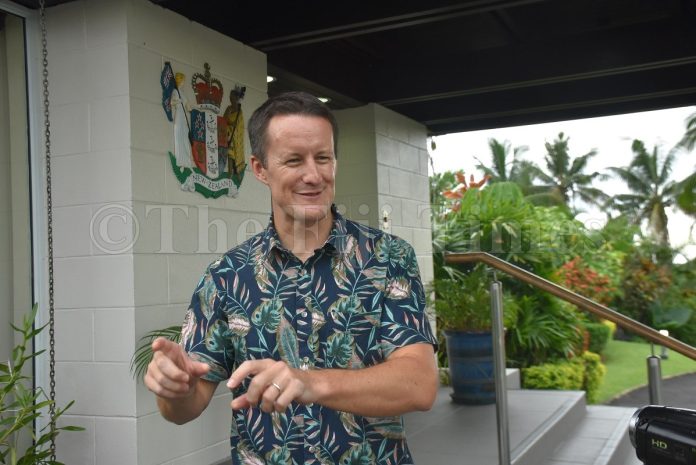Every country relies on imports of skilled labour and expertise however a lot of these countries have been facing pressures on particular sectors and areas where they have not been able to get those skills.
According to New Zealand High Commission, Trade Commissioner, Pacific David Dewar, the dynamic has really been very present all around the world with borders being closed in so many countries.
“There’s also been some incredible innovation that’s happened throughout COVID.
“And I think we’ve been seeing a lot of roles and personal and professional development occurring where previously they would have been expat labour used. “So hopefully, a lot of that can kind of be maintained.”
He said there were a lot of opportunities for Fiji.
“So if you think about the business process outsourcing sector, for example, Fiji is really, I think, capitalising on that demand for skill that’s happening from New Zealand and from Australia as companies look to diversify their profession, their professional workforce.
“I know that there’s a lot of interest from New Zealand and Australian companies in that sector.
“So really looking forward to seeing a lot more, professional development coming into Fiji but also Fiji providing, some of that workforce that’s so badly in demand.”
Fiji was regarded as a big, sophisticated economy by Dewar.
He said there was a lot going on with many different sectors and New Zealand companies were involved in so many of those.
He said the members of the Fiji New Zealand Business Council were representative of nearly every single sector here in Fiji.
“And I think that speaks to the incredible breadth of partnerships between New Zealand and Fiji in businesses.
“So for me, I think all investments, good investment and it really, I think, depends on the quality of the projects and the opportunities that are here and there are so many in Fiji. These include agriculture, manufacturing, professional services industry such as the BPO industry for example.
“Another area that I think a lot of New Zealand firms have particular expertise and is around renewable energy and some of those responses to climate change. “So we’re seeing a lot of interest in Fiji.
“Partnerships and opportunities from some of those New Zealand renewable energy, be it solar or hydro power companies and all of that associated infrastructure type work.”
Meanwhile, the demand for labour from the Pacific is absolutely “sky high” in New Zealand and there is a huge benefit for businesses from programmes such as the Recognised Seasonal Employer, according to New Zealand High Commission, Trade Commissioner, Pacific David Dewar.
“It is the demand for labour from the Pacific is absolutely sky high in New Zealand, and the value I think that Pacific people bring to all of those schemes, not just in terms of the work they do, but the community spirit, I think that they provide as well, is something that so many of New Zealand businesses, really prides very highly.
“I think there is a huge scope to grow a lot of that. I’ve got to say there’s not a huge amount of overlap between this council (Fiji New Zealand Business Council) and that scheme.
“It tends to be run independently but the scheme itself is very much community driven I think by community organisations around the Pacific here in Fiji and other Pacific countries.”
Sourcing and getting labour was one of the many challenges countries around the world including Fiji were facing as a result of COVID.
Dewar said undeniably these challenges also included supply chains and increased cost of freight, for example.
“And so, there’s a lot that business can do together to mitigate some of those, whether it’s as simple as sharing information about best practice and things like that, particularly in terms of some of the health measures in response to COVID.
“There’s been a lot that I know that this business council has done, that other organisations like FCEF have also done in conjunction with the government and in conjunction with partners like New Zealand to share experience and ways of doing things to mitigate some of the some of those challenges.
“Practical things like supply chain reviews and figuring out where to be sourced from how to get different suppliers of products together to ship in the same container, some of these sorts of innovative sharing type things have been really useful.”
“And also some of the remote training that’s been occurring as well.”
He said previously where there used to be physical trainers flown in from different markets to train up staff, a lot of that was being provided virtually.
He said businesses have played a really key role in all of that innovation.
“And hopefully, we can retain some of those lessons from after COVID,” he said.
SOURCE: FIJI TIMES/PACNEWS















